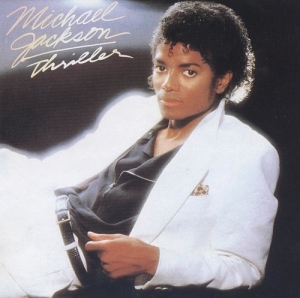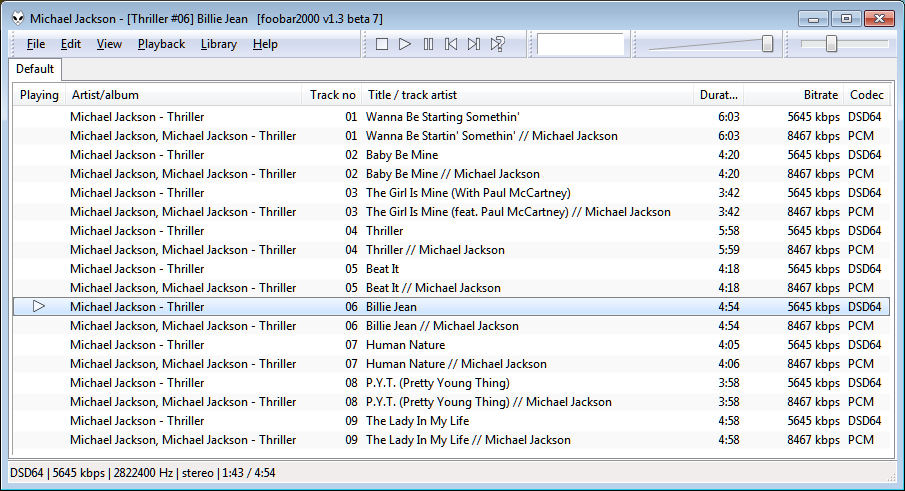What Does It Take To Turn The PC Into A Hi-Fi Audio Platform?
Most hi-fi audio is stored in digital form. With advancements in lossless compression, bit-perfect ripping/streaming, HD audio formats, multi-terabyte storage, and PC-friendly DACs, has the PC earned a place among high-end audio gear? At what price point?
Bonus Test: DSD Versus PCM; Billie Jean / Michael Jackson's Thriller
Sampling into Megahertz
Having tried 24-bit/88.2 kHz (and 96 kHz) tracks without being able to tell the difference from Red Book audio, we were starting to get skeptical about high-def audio. Still, we wanted to test the pinnacle of digital audio formats. We picked the most-sold album in history, Michael Jackson's Thriller.
We chose two formats: the exotic DVD-Audio (PCM at 24-bit/176.4 kHz) and the equally (if not more) exotic SACD (DSD64 at 1-bit/2.8224 MHz). The former is available from hdtracks.com for no less than $25. The latter is available from acousticsounds.com, also for $25.
To give you a better idea of the amount of data we're talking about, the uncompressed PCM version (24-bit/176.4 kHz, or 8467 Kb/s) is 2.5 GB, while the DSD64 version (1-bit/2.8224 MHz, or 5645 Kb/s) is 1.66 GB. That's just one album. From a bit rate perspective, DSD64 is essentially equivalent to 16-bit/176.4 kHz PCM, although that in and of itself says nothing about perceivable sound quality.
On paper, Realtek's ALC889 codec supports DSD. But we weren't able to get it working with foobar2000 due to a lack of an ASIO driver. Asus' Xonar Essence STX's DAC chip does support DSD, and Asus does supply a quality ASIO driver. However, Asus' DSP choice, the C-Media CMI8788, does not support DSD, breaking the chain. By design, the O2+ODAC does not support DSD. It's a driverless device that tops out at 24-bit/96 kHz PCM. That left us with Benchmark's DAC2 as the only device supporting DSD through foobar2000.
The catalog of SACDs is small, so a lack of support for this format is hardly a deal-breaker in any circumstance.
A Difficult Comparison
The DSD version of the album plays louder in foobar2000, creating a nightmare as we tried to volume-match. Unfortunately, foobar2000 does not support digital volume control of DSD files, and manually adjusting the DAC2 is an imprecise exercise at best. With that said, the tracks we listened to sounded extraordinarily similar, and we'd guess that they're from the same set of master tapes, though we don't know if the mixing is the same.
Given issues with volume matching and questions about mixing, we hesitate to generalize about DSD versus PCM, so please consider our observations specific to just these two recordings.
Get Tom's Hardware's best news and in-depth reviews, straight to your inbox.
Both listeners felt that, while the two versions were enjoyable, the DSD-based copy was better overall. Listener B observed "greater musicality", while Listener A noticed a difference but had a harder time putting it into words, eventually concluding that the DSD version felt more natural.
Current page: Bonus Test: DSD Versus PCM; Billie Jean / Michael Jackson's Thriller
Prev Page Results: Symphonic Dances / Andante Con Moto / Rachmaninoff Next Page Why We Need To Test Low-Impedance Headphones Soon-
SuckRaven Bravo ! Awesome, and a very thorough review. Even though as you mention, audio gear is not usually the forté/emphasis of the reviews here, it's refreshing to have someone at least try to cut through the (more often-than-not) overpriced arena of bullshit that is the field of "high-end" audio. I applaud the review, and the effort. Keep up the good work. More please.Reply -
PudgyChicken Just wondering, why not test a Creative X-Fi Titanium HD or something like that alongside the ASUS Xonar? It would be interesting to see some of the differences between different PCIe sound cards in this matchup. However I understand that what you were really going for was showing the difference between price point and form factor at the same time, so perhaps not testing two PCIe cards makes sense.Reply -
kitsunestarwind The biggest thing I have found for the PC is no matter how good your DAC is , if your speakers and AMP are crap, then it will never sound better.People spend big money on DAC's and forget that you need a high Quality amp with very very low THD (total harmonic distortions) and a very good set of Full Range speakers with high sensitivity if you want good sound, instead of crappy (albeit expensive) computer speakers especially sets with a sub.Reply -
maestro0428 Wonderful article! I love listening to music and do so mostly at my PCs. I try to set up systems where audio is important in component selection. Although we all love drooling over expensive equipment, many times it is not all that necessary for an amazing experience. I'd love to see more! Including smaller, studio speakers as I believe that speakers/headphones are the most important part of the equation. Keep up the great work!Reply -
Someone Somewhere Agree totally with this. It always annoys me when people say they're spending over $100 on a sound card, especially when it turns out that they're using Optical out, and the whole thing is basically moot.I now have a nice source to link to.Reply -
1zacster The thing is you can't just pick up two sets of good headphones, try them on different DACs/AMPs and expect to hear major differences, it takes longer than 5 minutes for your ears to adjust to newer headphones and for the differences to actually show. This is like taking food from Left Bank and then bringing in a bunch of hobos and asking them tel tell the differences between the foods.Reply -
dogman-x I use an optical cable from my PC to a home theatre receiver. With this setup, stereo CD audio content is sent as raw PCM to the receiver, not compressed into DD or DTS. These days you can buy a very good quality home theatre receiver for less than $200. Audio quality is outstanding.Reply -
Memnarchon I would love to see ALC1150 in these tests too, since its widely used at most Z87 mobos.Reply

